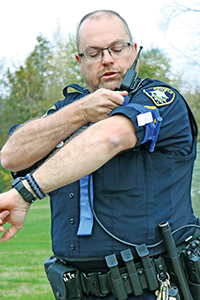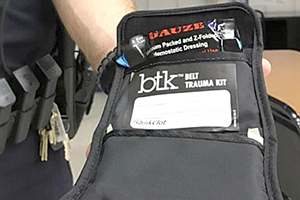By TIM O'NEIL
Rival youths stumble upon each other on a street in Springfield, Ill. A fight erupts, a knife flashes.
One boy, 14, suffers a deep gash to an upper arm and bleeds profusely.

Jerge
A Springfield police officer called to the scene opens his bleeding-control pack and stuffs the wound with clot-enhancing combat gauze. The boy is rushed to Springfield's HSHS St. John's Hospital, where he gets further treatment and recovers.
That incident occurred in November, one week after 150 Springfield officers were issued "Stop the Bleed" kits, which contain tourniquets, the special gauze and surgical gloves. St. John's Hospital donated the kits to the department and trained the officers in proper usage.
Since that knife fight, officers have used tourniquets from their kits to assist a woman who suffered a deep, fast-bleeding dog bite puncture to her leg and a man who was wounded in a shooting. Springfield Sgt. Charles Kean says the officers provided first aid as paramedics hurried to the scenes.
"Instead of standing there, telling people that help is on the way, we start treatment," Kean says. "You can feel helpless waiting for an ambulance."
Kean also works part-time in security at St. John's Hospital and served as liaison with the department for this project.

Springfield, Ill., police Sgt. Charles Kean practices wrapping a tourniquet around his arm during training to use "Stop the Bleed" kits. HSHS St. John's Hospital provided the kits and training.
Dr. Kari Jerge, medical director of the hospital's trauma center, says St. John's paid for the kits with a $25,000 gift from its philanthropy, the HSHS St. John's Foundation. Jerge says she learned about them by working with doctors who had been in the military.
"This is first-line medical treatment," Jerge says. "This is a skill set that can be learned easily and used quickly in chaotic situations."
Dr. Alexander Eastman, a senior adviser to the U.S. Department of Homeland Security in Washington, says the national "Stop the Bleed" program began nearly four years ago to train police officers in emergency treatment of fellow officers and civilians. Eastman says about two-thirds of the metropolitan police departments in the United States have equipped their officers with the kits.
The ones being used in Springfield cost about $150 each. Prices for other versions range from about $50 to more than $300. Most can be clipped onto an officer's belt.
Eastman says police departments have paid for them with "just about every funding model you can dream up."
He says he didn't know of other hospitals providing kits to their local police departments, but adds, "This is fantastic for the city of Springfield and St. John's. This is a tremendous gift to the community, with dividends for saving lives."
Jerge says the kits and curriculum have long been used in the military to provide quick temporary treatment in critical bleeding cases. She says police officers don't need advanced knowledge of paramedic techniques to learn how to use the kits.
Jerge supervised training of Springfield officers over several days in October. A training session takes less than a day.
Kean says the officers embrace the training because of its value on the street. "Officers often do a lot of eye rolling during a training course," he says, "but with this one, we have zero complaints."

A close-up of a "Stop the Bleed" kit that can be worn on officers' belts.
He says many officers are military veterans and already were familiar with the kits.
Jerge says the officers also welcome the training "because it can help them keep themselves and their buddies alive in a hostile situation."
She says one common misperception among the officers was a belief that tourniquets should be used only as a last resort because they can render useless the wounded limb. "We teach when, and when not, to use them," Jerge says.
Eastman, of Homeland Security, says the program isn't just for police officers. "It's a public program designed for ordinary people," he says.
Jerge says St. John's recently trained conservation officers in the Illinois Department of Natural Resources and wants to extend the program to other municipal police departments in central Illinois. The state bought kits for its conservation officers.
Dr. Charles L. Lucore, president and chief executive of St. John's, says the gift demonstrates the hospital's commitment to community health. "If providing our police officers with these kits and training to use them can save even just one life, it was worth the investment," Lucore says.
Copyright © 2017 by the Catholic Health Association
of the United States
For reprint permission, contact Betty Crosby or call (314) 253-3490.